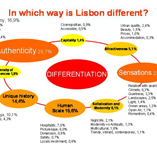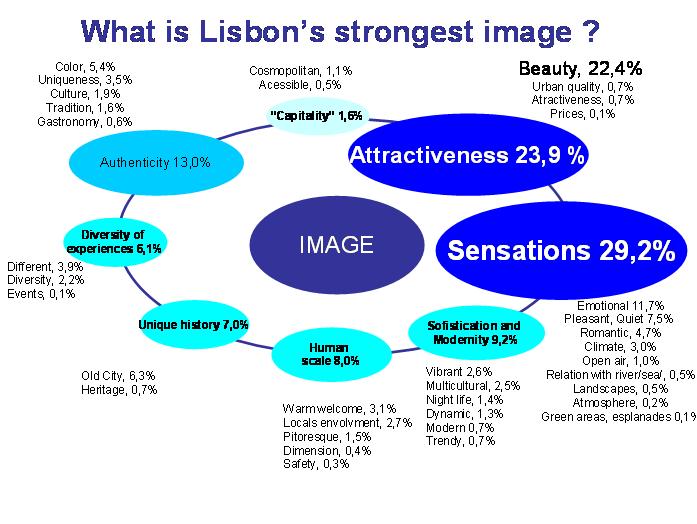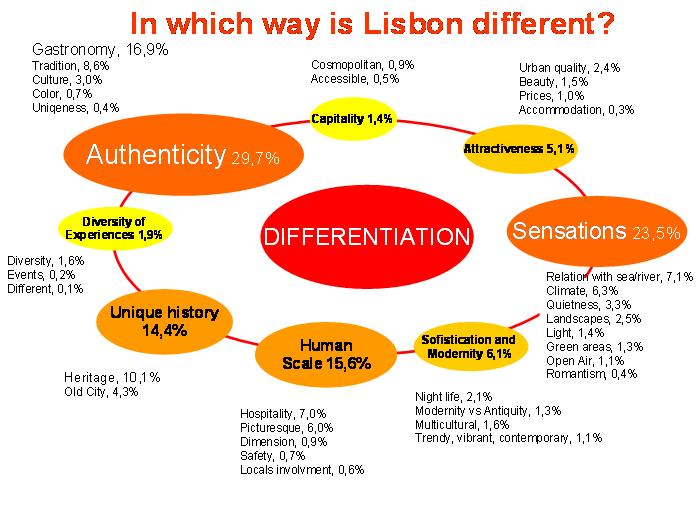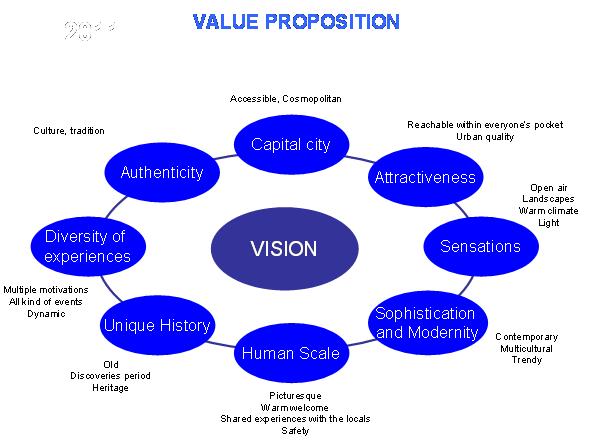The use of visitor surveys: a practical example from Lisbon

It is commonly accepted that visitor surveys can be precious tools, helping destinations not only to know their customers better but also to evaluate their marketing efforts. In this sense, visitors’ opinions can be of great help monitoring marketing plans and other strategic documents that guide destinations in their relationship with the market.
\n
This is absolutely true in the case of Lisbon, as I will try to demonstrate in this article with a concrete example about the image visitors have of Lisbon.
\n
In 2010, Turismo de Lisboa elaborated its strategic marketing plan for the 2011-2014 period. As a result, a strategic vision of the destination was defined to serve as the base for all marketing and development activities. So, what image of Lisbon were we about to make use of?
\n
\n
Eight vectors were established as the main attributes of Lisbon as a tourism destination:
\n
– Capital city – Lisbon, as the capital of Portugal, is a cosmopolitan area with excellent accessibility.
\n
– Attractiveness – Lisbon is a destination with urban quality and reachable within everyone’s budget.
\n
– Sensations – Lisbon is a destination that appeals to the senses, being a city to enjoy in the open air with its warm climate, its landscapes and its special light.
\n
– Sophistication and modernity – Lisbon is a city that keeps up with the times, providing a trendy and multicultural environment.
\n
– Human scale – Lisbon is a safe and picturesque place, “made of people”, where you can interact with the population easily and receive a warm welcome.
\n
– Unique history – Lisbon is an old city, full of history, with lots of heritage sites to explore, especially those from the Discoveries period.
\n
– Diversity of experiences – Lisbon is a dynamic city, capable of providing all kinds of events and satisfying multiple motivations for visiting.
\n
– Authenticity – Lisbon is a destination with a culture and tradition of its own.
\n
Given this framework, how can we evaluate whether these eight attributes are being well used and, especially, how can we measure the effectiveness of our communication efforts. Is the message reaching our customers?
\n
One way of finding out is by asking our visitors. And, in 2011, we did exactly this, by means of one of our visitor surveys.
\n
On this specific issue, we started by directly asking 2838 foreign visitors (spending at least one night in Lisbon) if they agreed with the vision we had of the city. And the results were as follows:
\n
| \n
\n |
\n
% agreement \n |
| Lisbon is an old city, full of history | 96,0% |
| \n
Lisbon is a place to enjoy in the open air \n |
\n
94,5% \n |
| \n
Lisbon has a great variety of things to see and do \n |
\n
92,1% \n |
| \n
Lisbon is a special destination that appeals to the senses of those who visit it \n |
\n
91,9% \n |
| \n
It’s visible that Lisbon is a capital city \n |
\n
90,7% \n |
| \n
Lisbon is human. It’s a city “made” by people \n |
\n
86,7% \n |
| \n
Lisbon is a tolerant and multicultural city \n |
\n
85,0% \n |
| \n
In Lisbon it’s easy to interact with the locals \n |
\n
82,4% \n |
| \n
Lisbon is unique in its culture and in its inhabitants’ way of life \n |
\n
82,1% \n |
| \n
Lisbon is romantic \n |
\n
81,8% \n |
| \n
Lisbon is peaceful, quiet, pleasant \n |
\n
78,7% \n |
| \n
Lisbon is agitated and animated \n |
\n
78,5% \n |
| \n
Lisbon is a city that keeps up with the times \n |
\n
75,4% \n |
| \n
Lisbon is well preserved \n |
\n
74,1% \n |
| \n
Lisbon is creative and trendy \n |
\n
73,5% \n |
\n
Given the high percentage of people that were agreeing with our view, we were really happy with this result. But at the same time, we had the feeling that these results were not giving enough weight to the importance that each one of those vectors has among the others.
\n
Fortunately, we had another question prepared for the visitors that kindly agreed to answer the survey: “How would you describe Lisbon in a single word (or small expression)?”
\n
After adapting to our framework the open answers to this question, we saw the following results:
\n
\n

\n
However, is this image consistent with a competitive environment? Are these attributes weighted in the same way when considering Lisbon’s differentiation potential?
\n
To answer this question, once again, we made use of the same survey and asked those 2838 foreign tourists to name a maximum of three aspects in which they thought Lisbon would be different from any other destination they’ve known. Using the same model, the results were the following:
\n
\n
\n

\n
As a conclusion, we may say that the visitor survey provided us with valuable information that deepens the initial analysis we made about the image of Lisbon. Starting with eight attributes that we valued equally, we now have proof that:
\n
– Those attributes are recognized by visitors;
\n
– Those attributes don’t show uniform strength in terms of immediate recognition;
\n
– When talking about differentiation, the importance of the same attributes is, once again, diverse.
\n
This information, together with the results of future surveys, will certainly be of great use when preparing our next marketing plan, and when this “vision” of Lisbon will be, once again, captured. Meanwhile, in the short term, these results are also helpful to “fine tune” the policies that emerge from the current plan.
\n
André Moura
Head of Research and Statistics
Turismo de Lisboa – Visitors and Convention Bureau
Member of ECM Research & Statistics Knowledge Group
amoura@visitlisboa.com
\n
